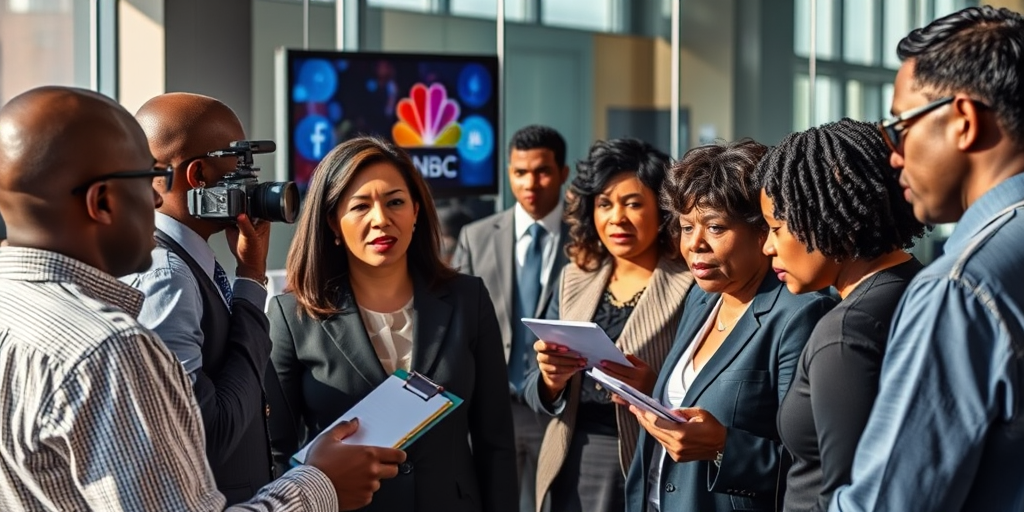Journalism Diversity Groups Meet With NBC Leadership Over DEI Coverage Cuts: ‘A Step Back’
In a recent meeting held on Wednesday, prominent journalism diversity groups raised pressing concerns with NBC leadership regarding substantial cuts to NBC News’ diversity-focused community verticals. This move, perceived by many as a regressive step, threatens NBC’s longstanding commitment to diverse and inclusive reporting—a mission critical to the United States’ culturally varied landscape.
Roots of Controversy
The meeting witnessed the participation of leaders from key organizations, including the Asian American Journalists Association (AAJA), the National Association of Black Journalists (NABJ), the Journalism & Women Symposium (JAWS), and NLGJA: The Association of LGBTQ+ Journalists. Notably absent was the National Association of Hispanic Journalists (NAHJ), though they have expressed intent to engage with NBC in future discussions.
This critical dialogue unfolded against a backdrop of widespread media industry cutbacks, with NBC laying off 150 staffers, effectively dismantling specialized teams such as NBC BLK, NBC Latino, NBC Asian America, and NBC OUT. Despite assurances from NBC’s leadership that content will continue via the broader newsroom staff, the dissolving of these dedicated teams has drawn sharp criticism for potentially undermining the depth and nuance that such specialized coverage brings to the table.
Stakes for the Community
The implications of this strategic shift are notably significant for both media professionals and the communities they serve. NBC News’ decision echoes broader trends across industries where diversity and inclusion initiatives face challenges—raising alarms for communities that rely on these platforms to share authentic and representative narratives.
Expressing disappointment, the NABJ remarked that the layoffs send an unsettling message at a time when diversity and inclusion efforts are critically needed. In their statement, they emphasized the moral and business imperatives of maintaining newsroom diversity, asserting that “dismantling teams that elevate underrepresented voices jeopardizes decades of progress.”
Local Impact and Historical Context
Locally, the repercussions for communities that have long depended on such coverage to amplify their voices and issues are profound. Decreased representation in media narratives risks marginalizing the very audiences most vulnerable to being unheard. In diverse locales similar to countless neighborhoods in urban hubs throughout America, inclusive reporting plays a pivotal role in bridging cultural gaps and fostering understanding.
Historically, the media industry has grappled with inclusivity, often failing to adequately represent the myriad communities that constitute the American populace. This latest development could potentially exacerbate feelings of disenfranchisement, reminding many of previous instances where economic considerations have overshadowed social responsibility.
For instance, residents in multicultural areas, similar to narratives we’ve seen from communities in cities like New York and Los Angeles, have previously critiqued the media for its myopic storytelling, which overlooks the complex identities and concerns within their neighborhoods. Active diversity initiatives in journalism have been seen as a vital counterbalance to these tendencies.
Perspectives and Possible Futures
Amid these cuts, NBC’s leadership cited financial pressures as the primary driver behind their decision while affirming a continuing commitment to cover diverse stories. However, journalism diversity groups urge NBC to deliver on this assurance by championing essential coverage of Black, Latino, Asian American, Pacific Islander, and LGBTQ+ communities.
“We appreciate that NBC News reaffirmed their commitment to covering diverse communities and experiences, but we implore them to reconsider the impact of these cuts,” an NAHJ spokesperson relayed. Meanwhile, JAWS issued a statement echoing similar sentiments, calling for a recommitment to cloistered yet diverse newsrooms.
Looking forward, the outcome of ongoing discussions and future meetings, such as the anticipated engagement between NBC and NAHJ, remains crucial. How NBC navigates this period will not only influence their reputation within the seemingly shrinking sphere of specialized media but also resonate more broadly as a reflection of industry commitments to diversity and inclusivity.
Local Resources and Engagement
For community members concerned about the potential decrease in representative news coverage, staying engaged through local journalism associations and support groups becomes even more vital. Additionally, advocacy efforts and public forums are expected to surface in response to these changes, providing platforms for dialogue and resistance.
As the media industry evolves amidst financial and cultural pressures, maintaining diverse, inclusive storytelling remains both a local necessity and a litmus test for the values claimed by media titans. It remains essential for residents, particularly those from marginalized communities, to voice their priorities, ensuring that media remains a dynamic reflection of all facets of society.
This unfolding story highlights the intersection of media practices and community interests, illustrating the ongoing challenge of aligning business decisions with the ethical standards that underscore responsible journalism—a key focus for Woke News and its commitment to covering events that yield profound local impact.







